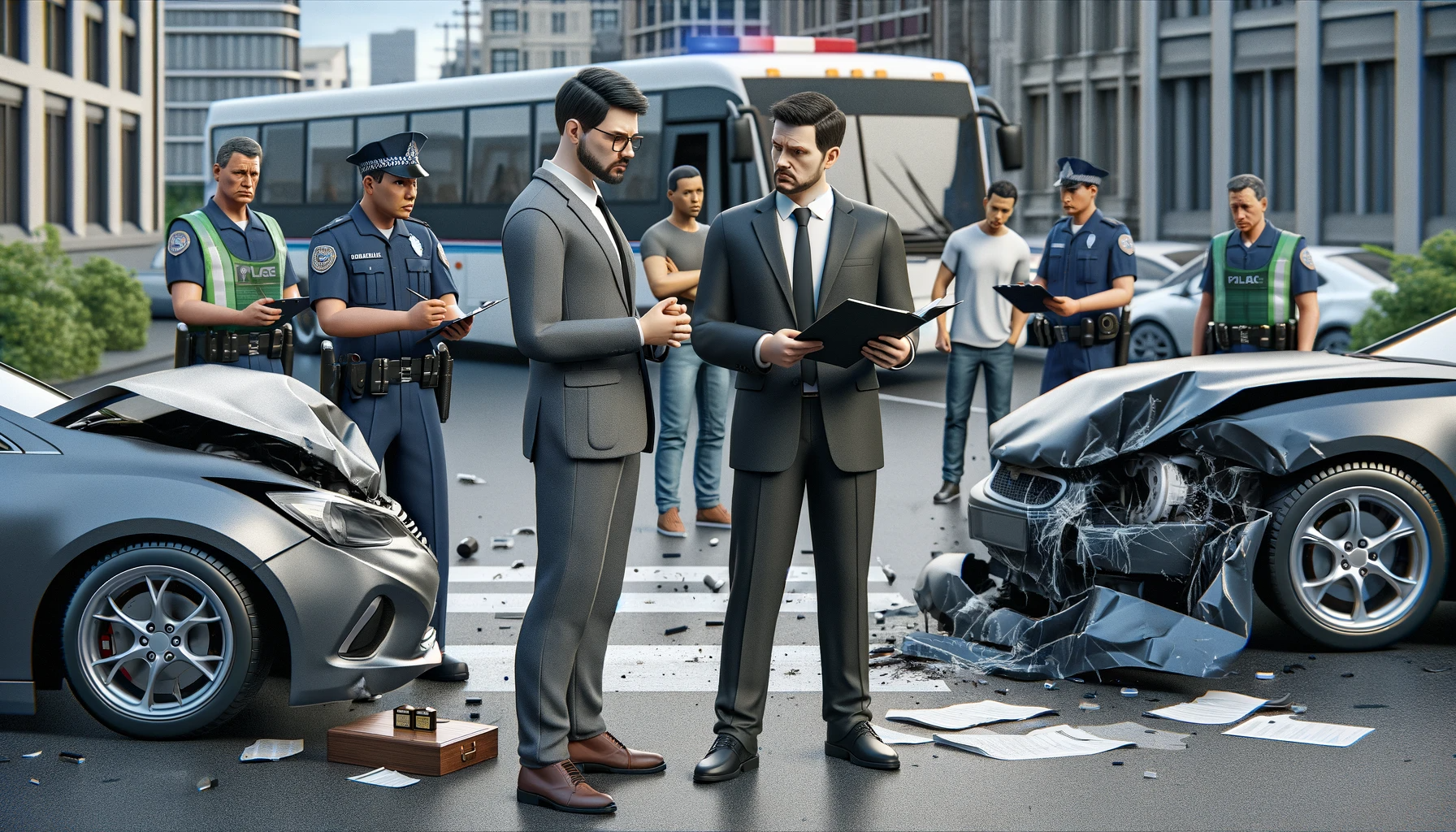Road to Justice: Navigating the Legal System for Auto Accident Claims
Introduction
Accidents happen unexpectedly, and when they do, they can turn your world upside down. Navigating the legal system for auto accident claims can be daunting, but understanding the process is crucial for securing the justice and compensation you deserve. This article will guide you through the intricate pathways of
auto accident claims, helping you to understand your rights and responsibilities.
Auto accidents can occur for various reasons, ranging from distracted driving and speeding to adverse weather conditions and mechanical failures. Understanding the common causes can help you take preventative measures and recognize when you have a valid claim.
- Distracted Driving: The leading cause of accidents, often due to mobile phone usage, eating, or talking to passengers.
- Speeding: Exceeding speed limits reduces reaction time and increases the severity of collisions.
- Drunk Driving: Impaired judgment and slower reflexes contribute to accidents.
- Weather Conditions: Rain, snow, and fog can make roads hazardous and reduce visibility.
Types of Damages Incurred
Accidents can lead to a variety of damages, both to property and individuals:
- Property Damage: Damage to vehicles and personal belongings.
- Medical Expenses: Costs related to immediate treatment and long-term rehabilitation.
- Lost Wages: Income lost due to inability to work.
- Pain and Suffering: Emotional and physical distress resulting from the accident.
Immediate Steps After an Accident
Taking the right steps immediately following an accident is critical in ensuring your safety and strengthening your claim.
Ensuring Safety and Medical Attention
- Check for Injuries: Prioritize the well-being of everyone involved and call emergency services if needed.
- Move to Safety: If possible, move vehicles out of traffic to prevent further incidents.
Gathering Evidence at the Scene
- Take Photos: Capture images of the accident scene, vehicle damage, and any visible injuries.
- Collect Information: Exchange contact and insurance details with other parties involved.
Importance of Police Reports
- Contact the Police: A police report provides an official account of the incident, which can be crucial for your claim.

Understanding how to file a claim with your insurance company is essential for initiating the compensation process.
Contacting Your Insurance Company
- Report Promptly: Notify your insurer as soon as possible to begin the claims process.
Understanding Your Insurance Policy
- Review Coverage: Know what your policy covers, including liability, collision, and comprehensive insurance.
Time Limits for Filing Claims
- Statute of Limitations: Each state has specific deadlines for filing claims; missing these can forfeit your right to compensation.
Determining who is at fault is a crucial aspect of
auto accident claims, affecting both the claim process and compensation.
Fault vs. No-Fault States
- Fault States: The party responsible for the accident pays for damages.
- No-Fault States: Each party's insurance covers their own damages, regardless of fault.
Role of Evidence in Proving Liability
- Documentation: Photographs, witness statements, and police reports are vital in establishing fault.
The Role of Insurance Companies
Insurance companies play a significant role in the claims process, and understanding their tactics can help you secure a fair settlement.
How Insurance Companies Assess Claims
- Investigation: Insurers evaluate the accident's details and the extent of damages.
- Adjuster Evaluation: An adjuster will inspect your vehicle and medical records to determine compensation.
Common Tactics Used by Insurance Adjusters
- Lowball Offers: Initial offers may be lower than what you're entitled to.
- Delaying Tactics: Adjusters might delay the process to pressure you into accepting a lesser settlement.
Legal Representation in Auto Accident Claims
Having a lawyer can significantly impact the outcome of your claim, providing expertise and advocacy.
When to Hire a Lawyer
- Complex Cases: In cases involving severe injuries or disputes, a lawyer can be invaluable.
- Denial of Claims: If your claim is denied or undervalued, legal assistance can help you challenge the decision.
How a Lawyer Can Help with Your Claim
- Negotiation: Lawyers negotiate with insurance companies to secure fair compensation.
- Legal Advice: They provide guidance on legal procedures and ensure your rights are protected.
Types of Compensation Available
Compensation for
auto accident claims can cover various damages, helping victims recover financially and emotionally.
Economic vs. Non-Economic Damages
- Economic Damages: Tangible losses like medical bills and lost wages.
- Non-Economic Damages: Intangible losses such as pain and suffering, emotional distress, and loss of enjoyment of life.
Punitive Damages in Severe Cases
- Severe Negligence: In cases of extreme negligence, courts may award punitive damages to punish the wrongdoer.
Navigating the Claims Process
Understanding the steps involved in the claims process can help you manage expectations and avoid common pitfalls.
Steps Involved in the Claims Process
- File a Claim: Report the accident to your insurer.
- Claim Evaluation: The insurance company investigates and assesses damages.
- Settlement Offer: The insurer proposes a compensation amount.
- Negotiation: Discuss and negotiate the offer if it's insufficient.
- Settlement or Litigation: Accept the offer or pursue legal action.
Tips for Negotiating with Insurance Companies
- Be Prepared: Have all documentation and evidence ready.
- Stay Firm: Don’t settle for less than what you deserve.
- Consult a Lawyer: Seek legal advice if negotiations stall.
Mediation and Settlement Negotiations
Mediation can be an effective way to resolve disputes without going to court, saving time and resources.
The Mediation Process
- Neutral Party: A mediator facilitates discussions between parties to reach a mutual agreement.
Advantages of Settling Out of Court
- Cost-Effective: Avoids the expenses of a trial.
- Time-Saving: Resolves disputes more quickly than litigation.
Filing a Lawsuit
When negotiations fail, filing a lawsuit may be necessary to secure fair compensation.
When to Consider Filing a Lawsuit
- Unresolved Disputes: If negotiations are unsuccessful or the offer is inadequate.
- Severe Injuries: Cases involving significant harm or long-term impact.
The Litigation Process Explained
- Filing a Complaint: Initiate the lawsuit by filing a legal complaint.
- Discovery Phase: Both parties exchange evidence and information.
- Trial: Present your case in court, where a judge or jury decides the outcome.
Preparing for Court
Proper preparation is essential for presenting a strong case and increasing your chances of success.
Gathering Evidence and Building a Case
- Collect Documentation: Gather all relevant records, including medical reports, photos, and witness statements.
What to Expect During a Trial
- Court Procedures: Understand the trial process, including opening statements, witness testimonies, and closing arguments.
Post-Trial Considerations
After a trial, there are several important steps and decisions to consider regarding compensation and appeals.
Collecting Your Compensation
- Court Order: Ensure the responsible party complies with the court's compensation order.
Appealing a Court Decision
- Grounds for Appeal: If dissatisfied with the outcome, consult a lawyer about potential grounds for appeal.

Preventative Measures to Avoid Accidents
Taking proactive steps can reduce the risk of accidents and enhance road safety for everyone.
Tips for Safe Driving
- Stay Focused: Avoid distractions and keep your attention on the road.
- Follow Speed Limits: Adhere to speed limits and drive according to conditions.
Importance of Defensive Driving Courses
- Skill Development: Defensive driving courses teach techniques to anticipate and respond to potential hazards.
Conclusion
Navigating the legal system for
auto accident claims can be complex, but understanding the process is key to securing justice and compensation. From gathering evidence at the scene to negotiating with insurance companies and potentially pursuing litigation, each step requires careful consideration and action. By staying informed and proactive, you can confidently navigate the road to justice after an
auto accident.
Look for an attorney who has the right legal resources for your legal needs.
Contact us here on the
Warmuth Law website or through our hotline 888-517-9888.
Frequently Asked Questions (FAQ's)
1. What should I do immediately after an auto accident?
Immediately after an accident, ensure everyone's safety, call emergency services, and gather evidence such as photos and contact information.
2. How long do I have to file an auto accident claim?
The time limit varies by state, typically ranging from one to three years. Check your state's statute of limitations to avoid missing the deadline.
3. What if the other driver is uninsured?
If the other driver is uninsured, your uninsured motorist coverage can help cover your damages. It's essential to have this coverage in your policy.
4. How is compensation determined in an auto accident claim?
Compensation is based on factors such as medical expenses, property damage, lost wages, and pain and suffering. Documentation and evidence play a crucial role in determining the amount.
5. Can I handle an auto accident claim without a lawyer?
While it's possible to handle minor claims without a lawyer, complex cases involving significant
injuries or disputes often benefit from legal representation.













